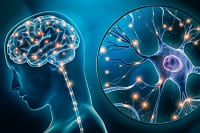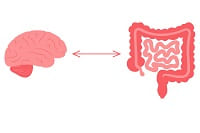.jpg?ext=.jpg)
Psychological Distress Increases Risk of Post-COVID-19 Complications
September 7, 2022
A study of nearly 55,000 participants found that individuals with psychological distress markers before a COVID-19 diagnosis were nearly 1.5 times more likely to show symptoms of post-COVID-19 conditions (commonly referred to as long COVID). Depression, anxiety, worry about contracting COVID-19, loneliness and stress were associated with complications post-COVID-19 infection and impairment in daily living, even after adjusting for health-related factors. Individuals with two or more types of psychological distress were the most likely to present post-COVID-19 conditions. Future research should explore whether interventions to reduce psychological distress can help prevent or mitigate physical health conditions, such as long COVID. To learn more, see the study in JAMA Psychiatry.
.jpg?ext=.jpg)
Higher Levels of Oxidative Stress Damage Found in Individuals with Psychiatric Disorders
August 3, 2022
A systematic review and meta-analysis of 82 studies involving more than 20,000 people provides further insights into the interaction between psychiatric disorders and physical health at the molecular level. Compared to control individuals, those with psychiatric disorders had higher rates of biomarkers associated with DNA and RNA damage due to oxidative stress. These findings suggest that damage from oxidative stress may adversely influence the physical health of individuals with psychiatric disorders and contribute to disease co-morbidities and aging. To learn more, see the study in JAMA Psychiatry.
_1.jpg?ext=.jpg)
Long-Acting Injectable Antipsychotics Associated with Improved Outcomes Compared to Oral Antipsychotics in Treatment of Schizophrenia
July 28, 2022
New research from Hong Kong examines the effectiveness of schizophrenia treatment approaches by comparing the clinical impacts of long-acting injectable antipsychotics (LAIAs) versus oral antipsychotics. In an analysis of more than 70,000 Chinese individuals with schizophrenia, researchers found that LAIAs were associated with 48% fewer hospitalizations for psychiatric disorders, 47% fewer hospitalizations for schizophrenia, 44% fewer suicide attempts, and 37% fewer hospitalizations overall. Further analysis also showed that individuals who began treatment with LAIAs sooner in the course of illness experienced improved outcomes compared to those who began treatment with LAIAs later on. While further research is needed, LAIAs continue to show promise as an effective treatment approach for schizophrenia. To learn more, see the study in JAMA Psychiatry.
.jpg?ext=.jpg)
Ongoing Improvements to Early Psychosis Research and Treatment
July 27, 2022
Research has shown that treatment of early psychosis improves clinical outcomes. In 2018, the Early Psychosis Intervention Network (EPINET) was established with the aim of conducting practice-oriented research to develop high quality care for treatment of first-episode psychosis (FEP). Currently, eight regional networks function through a learning health care (LHC) framework with diverse stakeholders, a research hub, and coordinated specialty care (CSC) programs. A national repository has also been created for collaboration in developing evidence-based practices, standardizing data collection, and producing assessments to inform policy. Researchers express interest in expanding access to LHC resources to non-EPINET CSC programs and working with international partners. To learn more, see the article in Psychiatric Services.
.jpg?ext=.jpg)
Genetic Testing Shows Promise for Medication Selection for MDD
July 12, 2022
Antidepressants are often one of the first treatment approaches for individuals with depressive disorders, but many struggle with side effects and finding the appropriate medication or dosage. Recent findings from a randomized controlled trial indicate that pharmacogenomic testing could be helpful in medication selection for patients with major depressive disorder (MDD). Participants who were prescribed medication and dosage based on their genetic testing results were less likely to present drug-gene interactions and more likely to experience remission over 24 weeks. However, the researchers note that the participants' improvements are not significant compared to the control group at the the 24-week mark. Pharmacogenic testing is an evolving field, and more research is needed to fully understand its efficacy for individuals with mental health conditions. To learn more, see the study in JAMA.

Utilizing AI to Identify Handgun Purchasers at Risk of Suicide
July 11, 2022
Firearms are responsible for the majority of suicide deaths in the U.S. In an effort to identify handgun purchasers at risk of suicide, researchers retroactively tested the reliability of a machine learning algorithm on a database of handgun purchases in the state of California from 1996-2015. Purchasing a revolver-style handgun, female gender, white race/ethnicity, and no previous firearm transaction were associated with firearm suicide within one year of purchase. Overall, the most important variables for accurately predicting firearm suicide within one year were handgun type, race/ethnicity, purchaser age, and month of purchase. These findings shed light on alternative methods of suicide prevention and may have implications for advocates and policymakers. To learn more, see the study in JAMA.

Brain Stimulation Shown to Affect How Brain Processes Stimuli, Potential to Aid in Stress-Related Disorders
July 1, 2022
New research suggests that noninvasive vagus nerve stimulation (nVNS), a form of brain stimulation therapy, may help train the brain to more appropriately respond to threats. Researchers conducted a randomized controlled trial among participants without mental health conditions to measure their reaction time and response levels to images. Participants who received nVNS had quicker reaction times overall, increased responsivity to negative images, and decreased responsivity to positive images. In other words, participants’ “fight or flight” response was efficient and appropriate based on the stimulus they were viewing. Future research should focus on testing nVNS in individuals with mental health conditions, particularly those related to stress and threat perception, such as PTSD and anxiety. To learn more, see the study in Brain Stimulation.
.jpg?ext=.jpg)
Canadian Study Finds Safety and Efficacy of Take-Home Buprenorphine/Naloxone Treatment Comparable to Supervised Methadone Treatment for Opioid Use Disorder
June 15, 2022
Individuals with opioid use disorder (OUD) are often prescribed treatment with methadone, which requires travel to specialized facilities and strict supervision. Recent findings from a randomized controlled trial suggest treatment with buprenorphine/naloxone that can be taken from home may produce similar results with increased flexibility. Patients in the buprenorphine/naloxone group were shown to have improved outcomes in opioid-free urine drug screens compared to those in the control group treated with methadone. Both groups had comparable rates of retention and adverse events.While the findings are promising, further research is needed to develop and evaluate accessible options for treating OUD. To learn more, see the study in the American Journal of Psychiatry.

Randomized Clinical Trial Finds Probiotics May Help Support Treatment of Major Depressive Disorder
June 3, 2022
New research suggests a potentially important role for the microbiome-gut-brain axis in treating individuals with major depressive disorder (MDD). In a randomized controlled trial, 21 patients were given a probiotic supplement in conjunction with antidepressants for one month. Compared to the control group, those given a probiotic showed greater improvement in depressive symptoms and emotional processing based on neural imaging. Further research should continue exploring the benefits of probiotic supplementation for managing symptoms of depression. To learn more, see the study in Translational Psychiatry.
.jpg?ext=.jpg)
COVID-19 Diagnosis Associated with Onset of Mental Health Conditions in Youth
June 2, 2022
To understand how COVID-19 affects youth mental health outcomes, researchers analyzed over 3 million records of children with no prior history of mental illness who had received either a positive diagnosis or negative test of COVID-19. Overall, 7.1 % of children with a positive COVID-19 diagnosis experienced onset of a mental illness – twice the rate of those without a COVID-19 diagnosis. The findings further detail the mental health implications of the COVID-19 pandemic and emphasize the need for appropriate supports in response. To learn more, see the study in Psychiatric Services.

